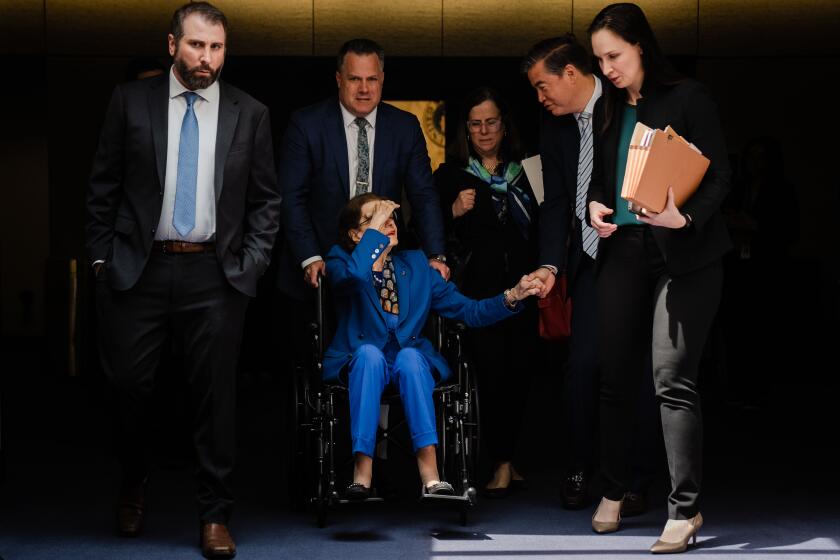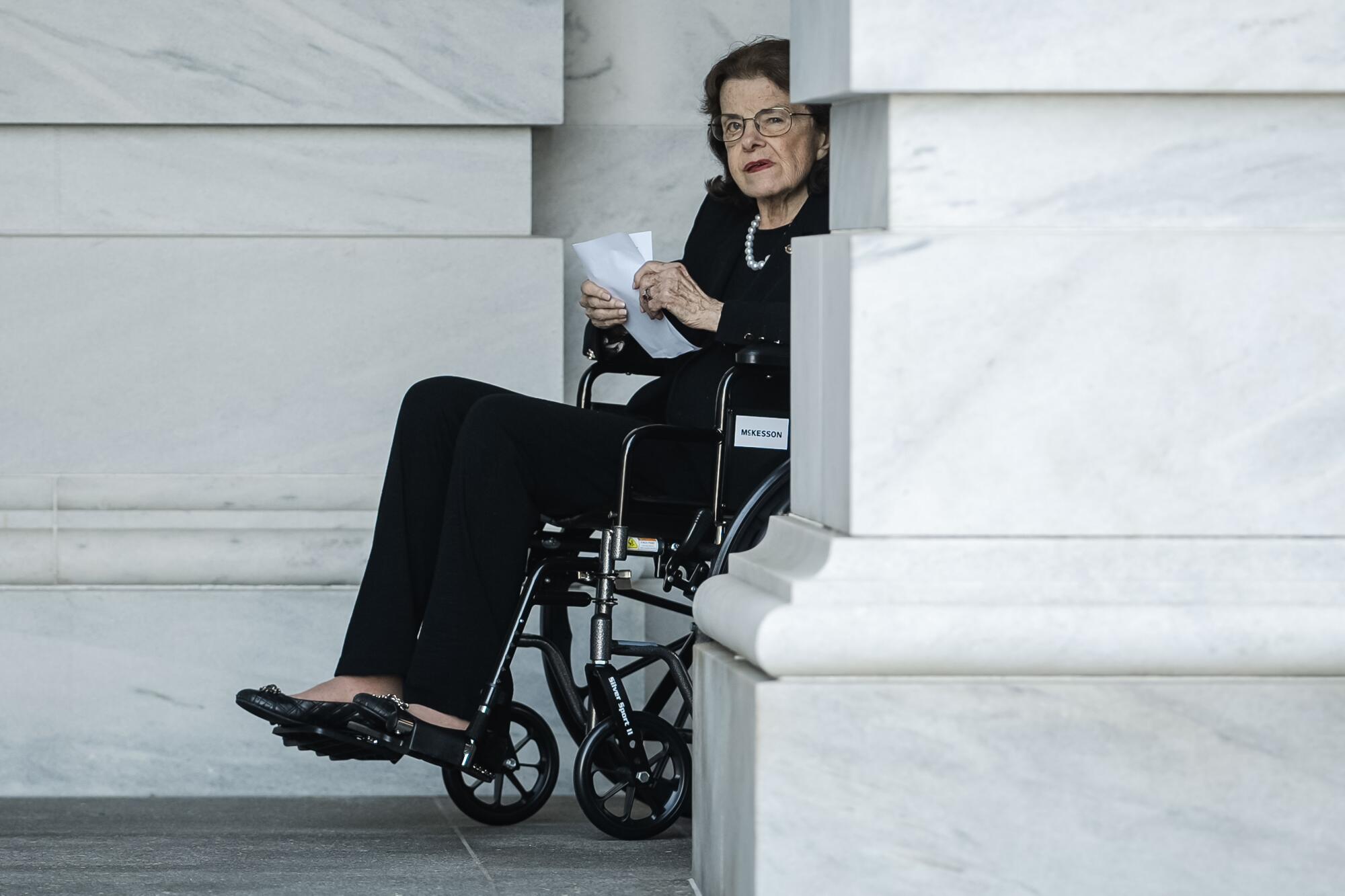
- Share via
WASHINGTON — A substantial majority of Californians feel that Sen. Dianne Feinstein is no longer fit for the job because of her recent declining health, and more voters believe she should resign than support her staying in office, according to a new UC Berkeley Institute of Governmental Studies poll co-sponsored by the Los Angeles Times.
Feinstein, 89, returned to Washington, D.C., in early May after months away recovering from shingles. Her absence caused heartache among fellow Democrats who hold a slim majority in the Senate, making tasks such as confirming judges harder.
The state’s senior senator has already said she would not seek reelection in 2024, when her term ends. The race to replace her is a close contest, with support for two Democrats, Reps. Katie Porter of Irvine and Adam B. Schiff of Burbank, and the one Republican, Eric Early, bunched tightly together among likely voters. A third Democrat, Rep. Barbara Lee of Oakland, lags behind.
Feinstein’s latest illness, which was more serious than her office initially revealed, has clearly taken a toll on her standing with voters.
According to the survey, nearly two-thirds of registered voters said her illness shows she is no longer fit to serve. That sentiment spans the ideological spectrum, including 2 out of 3 Democratic voters. Just 20% of voters disagreed.
Her image with voters has also worsened. Her favorably rating has dropped nearly 20 percentage points since she won a fifth term in 2018, with just 29% now holding a positive view of Feinstein.
Much of her decline in popularity came in the last three months — with favorable views dropping 8 points since voters were last surveyed in February. Just over half of voters, 52%, now have an unfavorable view of Feinstein and 19% have no opinion. Democrats, in particular, have grown more negative.
“Her constituents are finally weighing in,” said Mark DiCamillo, director of the Institute of Governmental Studies poll and a longtime California pollster. “Republicans haven’t changed their view of Feinstein over that period. It’s really her own party members. It’s erosion of support of Feinstein, particularly among the liberal wing, but it’s much broader now with her health issues.”
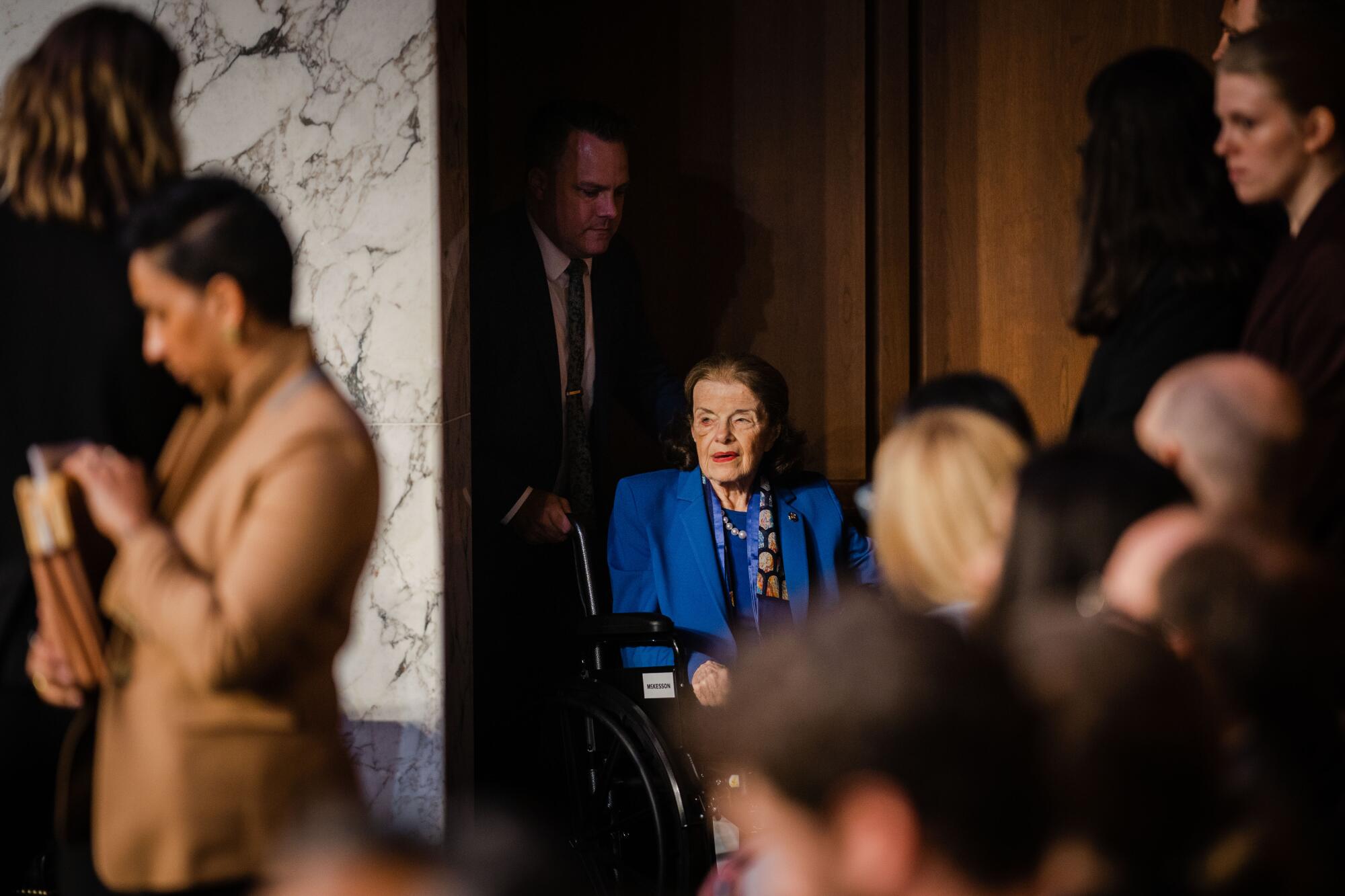
In February, Feinstein was hospitalized for a week with shingles. The illness kept her in San Francisco for months. The dozens of votes she missed, including several on judges, led some in her own party, including Rep. Ro Khanna of Fremont, to call on her to step aside.
Feinstein was defiant. At one point she asked for a temporary replacement to be appointed to the Judiciary Committee, which Republicans blocked.
Two weeks ago, the former San Francisco mayor returned to the Capitol to the great relief of Democratic leaders. Shortly after returning, Feinstein spoke with two reporters — including one from The Times — and appeared to not recall that she’d been absent from Congress for months due to her illness.
“I haven’t been gone,” she said. “I’ve been working.”
While recuperating in San Francisco, Feinstein also had a case of encephalitis — disclosed just last week — a complication from shingles that can be debilitating, causing memory loss and other effects.
Sen. Dianne Feinstein uses side and back doors to travel the Capitol complex, and a wall of staffers shield her from scrutiny, reports a Times photographer tasked with covering her. But at what cost?
Despite her return, a majority of California’s Democratic voters, 52%, said Feinstein should resign, which would allow Gov. Gavin Newsom to appoint a replacement. Just 24% of her fellow Democrats said she should serve out her term, with another 24% undecided, according to the poll.
Republicans, however, oppose the idea of Newsom appointing a senator. They split on what Feinstein should do, with 44% saying they were undecided.
Overall, 42% of voters said the senator should step down, with 27% saying she should finish her term and 31% unsure, the survey found.
Prominent Democrats, including Senate Majority Leader Charles E. Schumer of New York, said they were glad to have Feinstein back in Washington, adding that she should decide if she is healthy enough to remain in office. In recent years, several elderly senators in poor health faced calls to resign but ignored them.
Before she returned, some prominent Democrats, including former House Speaker Nancy Pelosi, a longtime San Francisco ally of the senator’s, said the calls for Feinstein to step down amounted to sexism.
“I’ve never seen them go after a man who was sick in the Senate in that way,” Pelosi said.
California voters don’t buy that argument, however, with 58% disagreeing that calls for Feinstein to resign were rooted in sexism. About half of voters were also not swayed by the view that losing Feinstein’s seniority in the Senate if she were to resign would be “a major loss for the state.”
Anna Bahr, a California-based Democratic political consultant who previously worked for Los Angeles Mayor Eric Garcetti and Vermont Sen. Bernie Sanders’ presidential campaign, said extensive coverage of Feinstein’s frail state has given voters a clear picture of her capacity to serve.
Even if that coverage has not been proportionate with male colleagues who were sick but in office, Bahr said, “the holes in her memory are very concerning, and I think we’ve seen enough evidence to know that the people of California are not being represented or served by their senior senator.”
“Older men may have gotten by, but at the end of the day she’s not well. Anybody can see she’s not well. Her health is poor,” Bahr said.
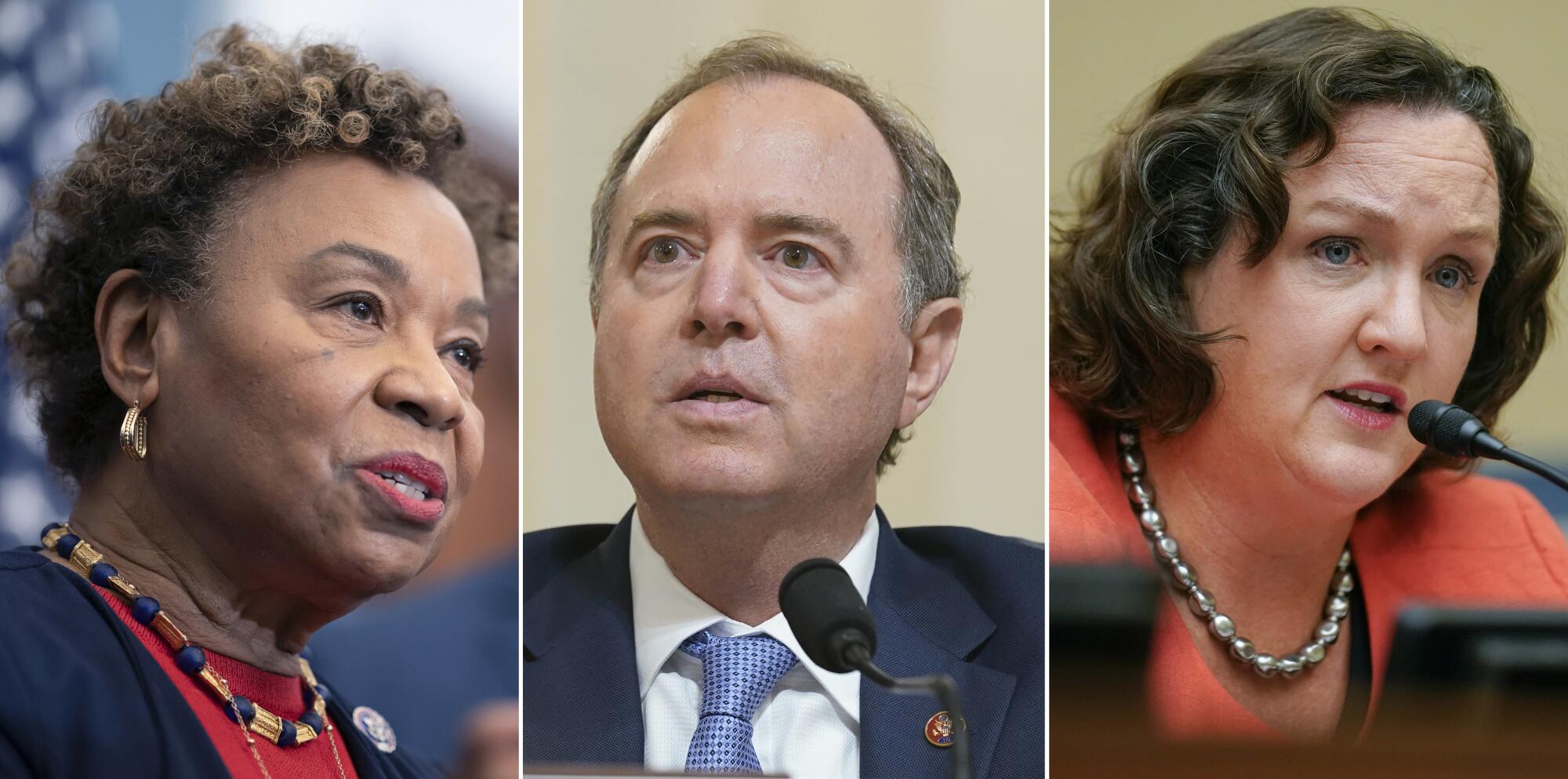
)
In the race to replace Feinstein, many voters haven’t made a choice.
This UC Berkeley poll on the Senate race includes Republican voters because there is now a Republican candidate. Among voters likely to take part in the primary, Early has support from 18%, nearly all Republicans. Porter is close behind with 17%, followed by Schiff with 14% and Lee at 9%.
Roughly 4 in 10 likely voters either are undecided or plan to vote for someone else.
DiCamillo said Early’s lead, which is well within the poll’s margin of error of 3 percentage points in either direction for the likely voter sample, is mostly a byproduct of his Republican affiliation.
“It could have been John Smith. You put the Republican tag next to the name, and they’re going to win the supportive Republicans,” DiCamillo said.
“It just opens up the dynamics of the race to one where we are really thinking about the possibility of a Democrat versus a Republican in the general — or will two Democrats rise to the top?” he said.
Although the 2016 and 2018 Senate elections featured two Democrats facing off in the general election, “the possibility does exist that it could be a Democrat versus Republican, and whoever that Democrat is, I’m sure they’re rooting for that outcome because the election is pretty much over if that happens,” DiCamillo said. Democrats have an overwhelming voter registration edge in the state.
Early is a Los Angeles resident and loyalist of former President Trump. He ran unsuccessfully for Congress in 2020 and has embraced new restrictions on abortion and has called for outlawing critical race theory in California schools.
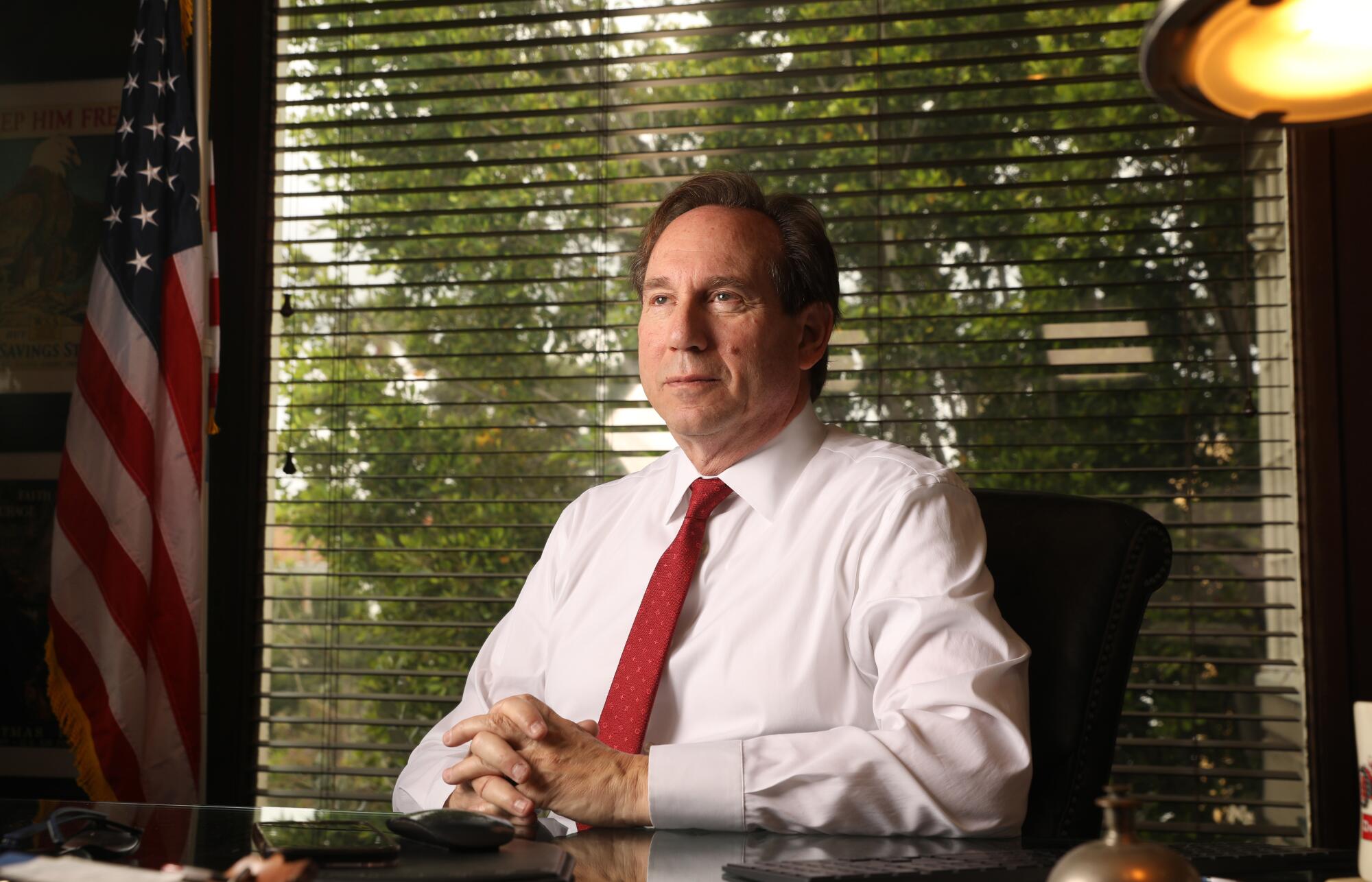
Early was by far the least-known candidate, with 71% of likely voters saying they had no opinion of him.
Schiff was the best known but also the most polarizing. Among all likely voters, 36% had a favorable view of him and 32% had a negative view. Another 32% said they had no opinion.
Porter, who represents a swing Orange County district and has recently been promoting a new book, is viewed favorably by 35% of likely voters; 20% view her unfavorably, and 46% have no opinion.
Lee has represented Oakland and other parts of the Bay Area at the state and congressional level for decades. She is more popular and better known in that region than statewide — with 26% of likely voters statewide saying they have a favorable view of her, 19% saying they had an unfavorable view and 55% saying they had no opinion of her.
Although she is one of just three Black members of Congress from California, even among Black voters, 45% said they had no opinion of Lee.
The poll was administered online in English and Spanish from May 17 to Monday among 7,465 California registered voters, of whom a weighted subsample of 5,236 were considered likely to vote in the March primary election.
The poll sample was weighted to match census and voter registration benchmarks. Because of weighting, precise estimates of the margin of error are difficult, but the results are estimated to have a margin of error of 2.5 percentage points in either direction for the full sample.
More to Read
Get the L.A. Times Politics newsletter
Deeply reported insights into legislation, politics and policy from Sacramento, Washington and beyond. In your inbox three times per week.
You may occasionally receive promotional content from the Los Angeles Times.
